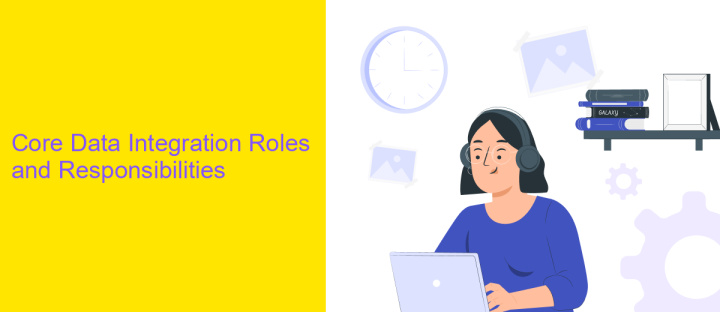Data Integration Job Titles
In today's data-driven world, the role of data integration has become increasingly vital for organizations seeking to harness the full potential of their data assets. As businesses strive to streamline operations and gain actionable insights, a variety of specialized job titles have emerged within the field of data integration. This article explores these roles, highlighting their responsibilities and the skills required to excel in this dynamic sector.
Understanding the Data Integration Landscape
Data integration is a critical aspect of modern business operations, enabling organizations to consolidate data from various sources into a unified view. This process not only facilitates better decision-making but also enhances operational efficiency. Understanding the data integration landscape involves recognizing the diverse tools and methodologies available to achieve seamless data flow across systems.
- ETL Tools: Extract, Transform, Load tools are essential for moving data between systems, ensuring data consistency and quality.
- Data Warehousing: Centralized repositories that store integrated data from multiple sources, supporting analytics and reporting.
- API Management: Facilitates data exchange between applications, enabling real-time integration and interoperability.
- Cloud Integration: Involves connecting cloud-based applications and services with on-premises systems for a cohesive IT environment.
- Data Virtualization: Provides a unified data view without physical data movement, enhancing agility and reducing costs.
Professionals in the data integration field must be adept at navigating these components, leveraging them to create robust data ecosystems. With the increasing complexity of data environments, expertise in integration strategies is vital for ensuring data accessibility and usability, ultimately driving business success.
Core Data Integration Roles and Responsibilities

In the realm of data integration, several core roles are essential for successful operations. Data Integration Specialists are responsible for designing and implementing data solutions that ensure seamless data flow between disparate systems. They work closely with system architects to create robust integration frameworks and troubleshoot any issues that arise during data transfer. Additionally, Data Analysts play a crucial role by interpreting integrated data to provide actionable insights, helping organizations make informed decisions.
Project Managers oversee the entire data integration process, ensuring that timelines and budgets are adhered to while coordinating between different teams. Meanwhile, Data Engineers focus on building and maintaining the infrastructure required for data integration, ensuring data quality and consistency. Tools like ApiX-Drive can be invaluable in this process, as they offer automated solutions for setting up integrations, reducing manual effort and minimizing errors. By leveraging such services, organizations can streamline their data integration processes, ensuring that data is accessible and usable across various platforms.
Specialized Data Integration Job Titles

In the rapidly evolving field of data integration, specialized job titles have emerged to address the unique challenges and requirements of this domain. These roles are essential for ensuring seamless data flow across various platforms and systems, thereby enabling organizations to make informed decisions based on comprehensive data analysis. Professionals in these positions possess a deep understanding of data architecture, integration tools, and industry-specific data needs.
- Data Integration Architect: This role involves designing and implementing data integration solutions, ensuring they align with the organization's data strategy and architecture.
- ETL Developer: Focused on Extract, Transform, Load processes, these professionals create and manage data pipelines to facilitate data movement and transformation.
- Data Integration Analyst: Responsible for analyzing data integration requirements and developing strategies to optimize data flow and quality across systems.
- Data Integration Engineer: These engineers build and maintain the infrastructure necessary for data integration, ensuring reliability and performance.
As businesses continue to prioritize data-driven strategies, the demand for specialized data integration roles will likely grow. These professionals not only bridge the gap between disparate data sources but also enhance the overall efficiency and accuracy of data-driven operations, making them indispensable in today's data-centric landscape.
Emerging Trends in Data Integration Careers

The landscape of data integration careers is rapidly evolving, driven by advancements in technology and the growing demand for seamless data management. As organizations prioritize data-driven decision-making, the role of data integration specialists is becoming increasingly vital. Professionals in this field are now expected to possess a diverse skill set that combines technical expertise with strategic thinking.
One of the emerging trends is the integration of artificial intelligence and machine learning into data processes. This shift requires data integration experts to not only manage data pipelines but also to implement AI-driven solutions that enhance data accuracy and efficiency. Additionally, the rise of cloud-based platforms is reshaping how data is stored and accessed, necessitating proficiency in cloud technologies.
- Increased demand for real-time data integration capabilities.
- Growing importance of data governance and compliance.
- Expansion of roles focusing on data security and privacy.
- Emergence of hybrid roles combining data integration with data analytics.
As these trends continue to unfold, professionals in the data integration field must adapt by continuously updating their skills and embracing innovative solutions. This dynamic environment offers numerous opportunities for career growth, making it an exciting time to be involved in data integration.


Skills and Qualifications for Data Integration Professionals
Data integration professionals require a diverse set of skills and qualifications to effectively manage and streamline data processes. A strong foundation in database management and SQL is crucial, as these experts frequently work with large datasets and need to ensure data accuracy and integrity. Familiarity with ETL (Extract, Transform, Load) processes is also essential, as it allows professionals to efficiently move data between systems. Additionally, knowledge of programming languages like Python or Java can be beneficial for automating tasks and creating custom data solutions.
In today's digital landscape, understanding cloud platforms and data integration tools is vital. Professionals should be adept at using services like ApiX-Drive, which facilitates seamless integration between various applications and systems. Strong analytical skills and attention to detail are necessary to troubleshoot and resolve data discrepancies. Furthermore, excellent communication skills are important, as data integration specialists often collaborate with cross-functional teams to ensure data aligns with business objectives. A bachelor's degree in computer science, information technology, or a related field is typically required, though relevant experience can also be a significant asset.
FAQ
What are common job titles in data integration?
What skills are essential for a Data Integration Specialist?
How can businesses automate data integration processes?
What is the role of an ETL Developer in data integration?
How does an Integration Architect contribute to data integration projects?
Do you want to achieve your goals in business, career and life faster and better? Do it with ApiX-Drive – a tool that will remove a significant part of the routine from workflows and free up additional time to achieve your goals. Test the capabilities of Apix-Drive for free – see for yourself the effectiveness of the tool.

